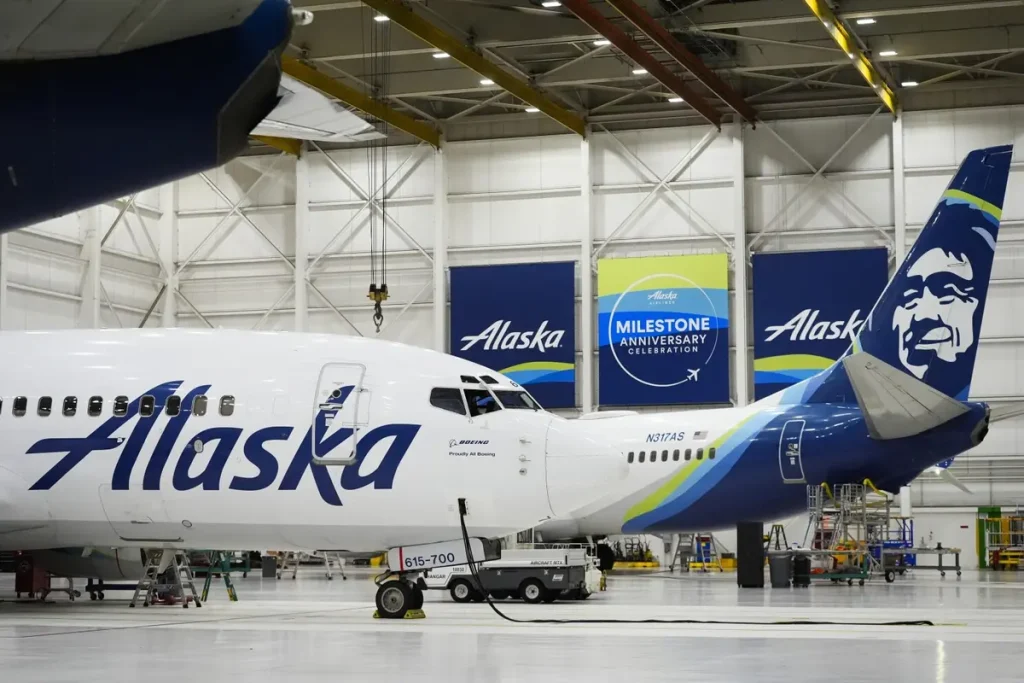Unspecified Alaska Airlines IT Glitch Forces Immediate Ground Stop
Late Sunday evening, Alaska Airlines and subsidiary Horizon Air requested a full fleet ground stop following a systems disruption around 8 p.m. Pacific. The FAA confirmed the halt applied to all mainline flights and regional operations, impacting over 200 aircraft across the U.S.
Within approximately three hours, operations resumed after the airline resolved the glitch—but not before causing widespread delays and confusion.
The grounding marks the second complete fleet stoppage in just over a year for Alaska Airlines. A similar event occurred in April 2024 due to a weight-and-balance system failure. Alaska Air Group, which operates 238 Boeing 737s and 87 Embraer 175s, has no immediate details about the cause of this outage .
Onboard Delays and Desk Lines
Social media posts revealed travelers stranded in airports and stuck on tarmacs amid poor communication. Some reported being delayed for hours, with little information or refreshments.
@ricardoguevara8382 #AlaskaAirlines grounds more than 200 planes nationwide. All flights cancelled 😱 #Seattle #WA #Alaska #CancelledFlights #Caos #Airport
@maimaileilei Currently just making friends on Reddit who are also in this dump, props to Alaska airlines employees for trying their best during this time!!! 🙂↕️🙂↕️🙂↕️ #lasvegas #alaskaairlines #systemoutage #alaskaair #flightsdelayed
♬ Funny video “Carmen Prelude” Arranging weakness(836530) – yo suzuki(akisai)
In major hubs—Seattle, Los Angeles, Portland—anger and exasperation grew as passengers waited for updates. Alaska issued formal apologies, advising travelers to check flight status, and offered vouchers and reimbursements where applicable.
By approximately 11 p.m. Pacific, Alaska Airlines and Horizon Air resumed departures.
Despite reopening, the airline cautioned that crew and aircraft positioning would take time, resulting in residual delays into early Monday.
This incident draws attention to growing concerns over cyber and tech vulnerabilities within the airline industry.
Alaska Air Group experienced another tech breach at Hawaiian Airlines in June, and global carriers like WestJet and Qantas faced similar incidents. Meanwhile, cybersecurity firms have warned of elevated threats from hacking groups targeting aviation infrastructure.
Amidst global warnings—such as Microsoft’s notice of “active attacks” on critical IT systems—the severity of this grounding underscores the critical importance of system resilience.
Alaska Airlines’ recent operational halts aren’t isolated. In January 2024, the airline faced scrutiny after a Boeing 737 MAX 9 had a door panel blowout at altitude, prompting an FAA grounding. The subsequent safety inspection revealed needed repairs on 65 planes.
In April 2024, weight-and-balance computer failures grounded the fleet again, followed by this latest incident—a pattern that raises questions about systemic robustness.
What Travelers Should Do Now
Alaska Airlines recommends:
-
Check flight status in real-time before heading to the airport
-
Keep receipts for any extra expenses—like meals or hotels—for possible reimbursement
-
Anticipate delays as operations recover this morning
Despite being resolved, the outage means some flights today may still be impacted by the ripple effects of Saturday night’s stoppage.
Alaska Airlines’ Official Response
Alaska Airlines released a public apology and thanked passengers for patience. They emphasized their commitment to resolving issues and strengthening system resilience going forward
The FAA supported the airline’s cautious approach, confirming the ground stop was lifted once it was safe to fly again.
The unplanned grounding of Alaska Airlines highlights the escalating importance of robust IT infrastructure in modern aviation. While this incident was not linked to a cyberattack, it reveals how critical system reliability has become. As airlines continue to rely on digital operations, incidents like this—coupled with past mechanical and cyber events—underscore an urgent need for investments in tech resilience, fail-safes, and rapid-response strategies to prevent cascading disruptions in air travel.


